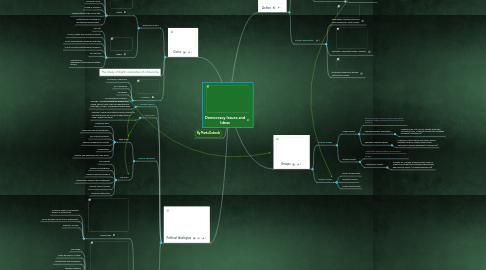
1. Civics
1.1. Rights and Duties
1.1.1. Duties
1.1.1.1. Obeying the law
1.1.1.2. Taking responsibility for oneself and one’s family
1.1.1.3. Serving on a jury
1.1.1.4. Voting in elections
1.1.1.5. Helping others in the community
1.1.1.6. Protecting and enjoying our heritage and environment
1.1.2. Rights
1.1.2.1. To Vote
1.1.2.2. To Life, Liberty and Security of Person
1.1.2.3. To not have property unlawfully searched
1.1.2.4. To not be imprisoned/detained unlawfully
1.1.2.5. To a fair trial
1.1.2.6. Protection of languages/cultural/minority ethnic groups
1.2. The Study of Rights and duties of citizenship.
1.3. Freedoms
1.3.1. Of Speech, Expression
1.3.2. Of Conscience
1.3.3. Of Religon
1.3.4. Of Association/Assembly
2. Political Ideologies
2.1. Thomas Hobbes
2.1.1. Ideology: Humans are naturally greedy and selfish, need to have rules and regulations to keep them in order. Conservative/Right Wing.
2.2. John Locke
2.2.1. Ideology: Humans are naturally good-natured, do not need a strict set of rules to keep them in order. Liberal/Left Wing.
2.3. Political Spectrum
2.3.1. Right Wing
2.3.1.1. Traditional style
2.3.1.2. Controlled view on immigration
2.3.1.3. Pro-Military Discipline
2.3.1.4. Capital Punishment for crimes
2.3.1.5. Conservative
2.3.1.6. Citizens take healthcare into own hands
2.3.2. Left Wing
2.3.2.1. Pro-Change
2.3.2.2. Positive to immigration
2.3.2.3. Against Military for funding
2.3.2.4. Government supports the less wealthy
2.3.2.5. Tolerant view on crimes
2.3.2.6. Universal Health Care
2.4. Leadership Styles
2.4.1. Laissez-faire
2.4.1.1. No group leader or recognized system of government
2.4.1.2. Social disorder due to lack of government
2.4.1.3. Example: Somalia
2.4.2. Autocratic
2.4.2.1. One leader
2.4.2.2. Limits discussion on ideas
2.4.2.3. Less extreme than totalitarian
2.4.2.4. Example: England
2.4.3. Democratic
2.4.3.1. Rests in the citizen's hands
2.4.3.2. Majority of the world's leadership style
2.4.3.3. Example: Canada
2.4.4. Aristocracy
2.4.4.1. Small, privileged ruling class.
2.4.4.2. Example:Ancient Greece
2.4.5. Theocracy
2.4.5.1. God/religious figure is recognized as the leader.
2.4.5.2. Example: The Vatican
3. By Marta Dubovik
4. Action
4.1. Civil Action
4.1.1. Co-operation
4.1.1.1. Writing letters to newspaper editors/government representatives
4.1.1.2. Hold meetings/Sign a petition
4.1.1.3. Advertise case with flyers/posters/newsletters
4.1.2. Non Co-operation
4.1.2.1. Refusal to buy products from certain place in community/nation/company (Boycotting)
4.1.2.2. Refusal to obey a law one thinks is unjust
4.1.2.3. Refusal to pay a portion of one's income tax owed
4.1.3. Intervention
4.1.3.1. Participates in demonstrations/protests, in some cases blocking people's ability to move
4.1.3.2. Occupy land that is being misused
4.1.3.3. Volunteer for a humanitarian cause of non-profit charity/organization
4.2. Conflict Resoloution
4.2.1. Negotiation: Discuss issues and solve differences. Often careful.
4.2.2. Mediation: Third party makes a solution.
4.2.3. Arbitration:Third party decides outcome of conflict.
5. Groups
5.1. Interest Groups
5.1.1. Lobby Groups
5.1.1.1. Well-organized, influence policy by making engaging, regular dialogue with government officials.
5.1.1.2. Canadian Bankers Association
5.1.1.2.1. Lobbied on:do-not-call list, identity theft laws, accounting rules, corporate income tax, mortgage insurance (Macleans.ca)
5.1.1.3. Canadian National Railway
5.1.1.3.1. Lobbied on:First Nations land claims, Pacific gateway initiative, railway noise control, replacement worker regulations (Macleans.ca)
5.1.2. Protest Groups
5.1.2.1. Use public demonstrations to influence public opinion/pressure government officials to act.
5.1.2.2. Students for Liberty
5.1.2.2.1. Protests for: "Unified, student-driven forum of support for students and student organizations dedicated to liberty." (Studentsforliberty.org)
5.2. Charity Groups
5.2.1. ACCES Employment
5.2.2. Covenant Church
5.2.3. Yonge Street Mission

